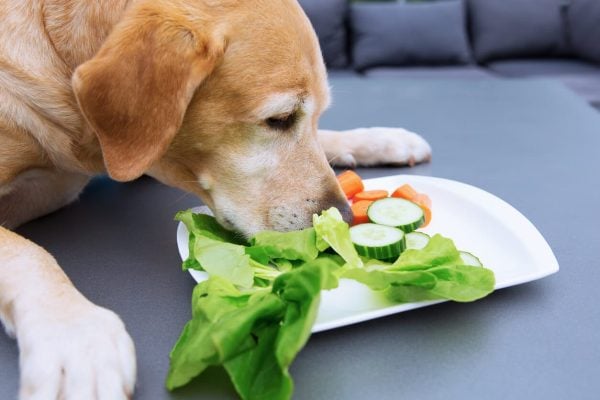- Not a substitute for professional veterinary help.
Cucumbers make a nutritious, refreshing, and hydrating addition for people and for dogs. Experts say dogs can eat cucumbers safely, as long as they only eat them occasionally. Some dogs may find cucumbers a crunch-worthy alternative to other training treats.
Just limit how many cucumbers your dog eats to a few slices. Cucumbers have a lot of fiber, and too much fiber can cause gastrointestinal discomfort.
Read on to learn more about feeding dogs cucumbers, including health benefits and risks, how much your dog can eat, and other dog-friendly fruits and vegetables.
How Much Cucumber Can My Dog Eat?
The amount of cucumber a dog can eat will generally depend on their size. According to Dr. Ambika Vaid, Integrative Veterinarian and Advisor to Badlands Ranch, cucumber portion sizes for dogs look like:
- 1-2 slices a day for dogs between 2 and 20lbs
- 4-5 slices a day for dogs between 25 to 50lbs
- A small handful of cucumber slices for dogs over 50lbs
As a general rule, it’s a good idea to ask your vet anytime you try feeding your dog a new food.
Are Cucumbers Nutritious For Dogs?
“Cucumbers contain vitamins B, C, and K, along with potassium,” Dr. Vaid says. But this doesn’t mean you should rely on cucumber to fulfill your dog’s nutritional needs.
Your dog won’t get enough of these nutrients from cucumbers. Your dog’s primary source of nutrition should always be a balanced and complete dog food. If you have any questions about what type of food to feed your dog, your vet can offer more guidance and food recommendations.
Do Cucumbers Have Health Benefits?
The main health benefit of cucumbers is their high water content.
Cucumbers are about 95% water, which makes them a delightfully crunchy way for your dog to stay hydrated on hot days. Dr Vaid recommends feeding them if your dog needs to get more water but doesn’t like drinking it.
Dr. Brett Levitzke, DVM, Chief Medical Officer with VERG and Veterinary Advisor to Get Joy, adds that cucumbers are also low in calories. There are just 10 calories in 3.5 ounces of cucumber. “This makes them an excellent part of your dog’s weight control plan alongside daily exercise,” he adds.
What Are The Risks Of Dogs Eating Cucumbers?
Experts agree it’s generally safe for dogs to snack on cucumbers unless they aren’t raw. Dogs should not eat pickled or processed cucumbers. “Added salts, spices, or dressings can be harmful to dogs,” says veterinarian Doc Halligan, host of the Collars and Cents radio show and podcast.
“The fiber that is so beneficial can cause vomiting and diarrhea if fed in excess,” Dr. Levitzke adds. Too much cucumber can cause your dog to:
- Choke
- Vomit
- Have diarrhea
- Have an allergic reaction
Doc Halligan recommend monitoring your dog for allergic reactions or digestive issues for first time eaters. If you notice any unusual symptoms, check with your vet before you give them cucumber again.
How To Prepare Cucumbers For Dogs
You can help keep your dog safe and healthy by cutting cucumber into small pieces and limiting the amount you give them—for big and small dogs alike. Dr. Levitzke recommends cutting cucumbers to prevent choking. Try thin, round slices or small chunks.
You can then offer these bite-sized portions as a treat, during training sessions, or as a topper on their regular meal. “And as with any treat, remember that moderation is key to maintaining a balanced diet,” Dr. Savageau says.
Wash and deseed your cucumbers
“You’ll want to wash the cucumber thoroughly before offering it to your dog, says Dr. Nicole Savageau, a veterinarian with mobile pet care service The Vets. In some cases, the skin may have been treated with pesticides or wax coatings, which can be difficult for dogs to digest.
“If you’re uncertain about the source or the quality of the skin, consider peeling them,” she adds.
Most dogs will happily eat cucumber seeds, but Dr. Vaid notes that some dogs may not be able to digest these well. You can always scoop out the part that has seeds.
Other Fruits And Vegetables Dogs Can Eat
Dog can enjoy many of the same fruits and vegetables you eat, such as:




